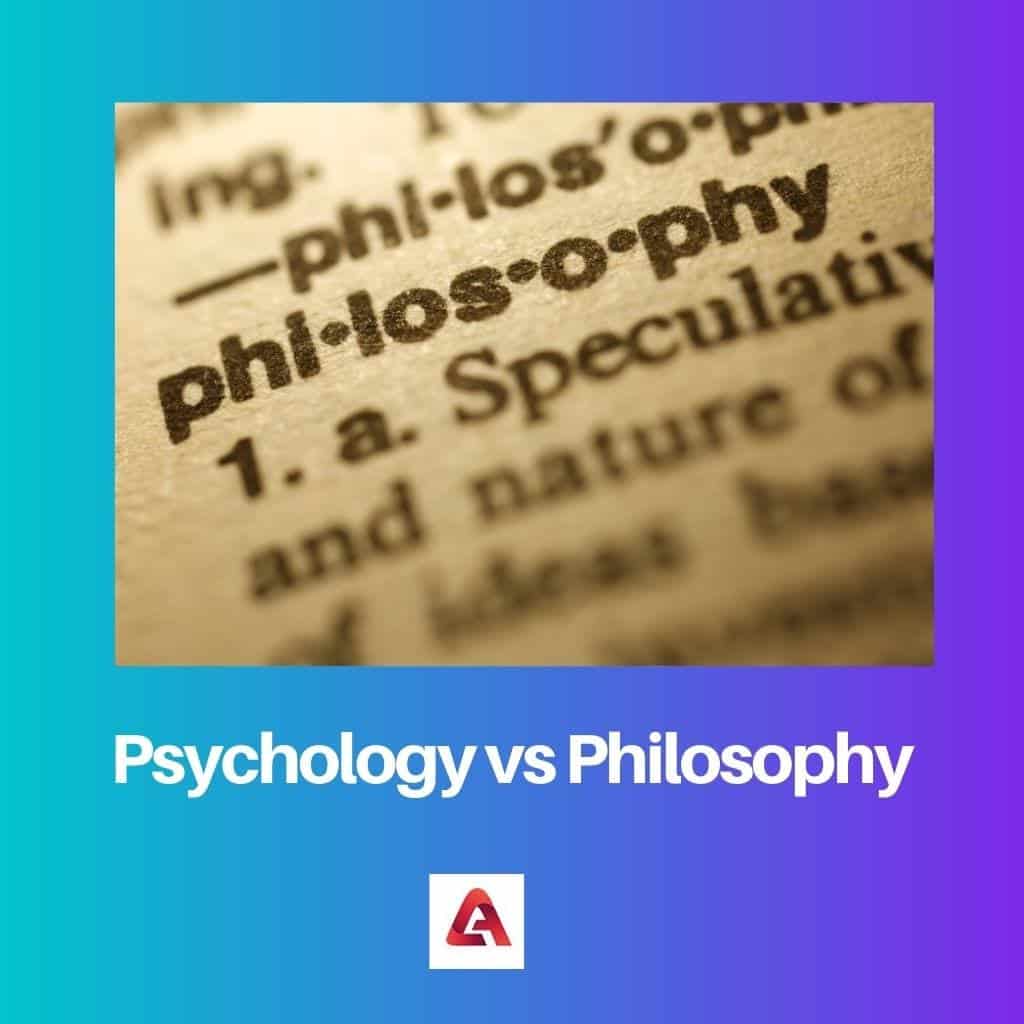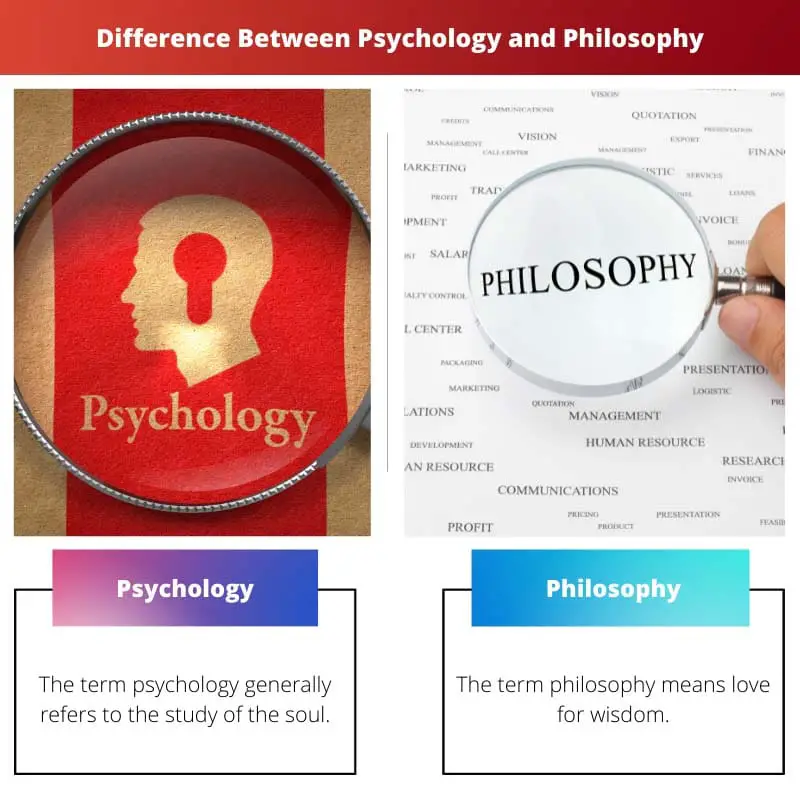Though psychology and philosophy are completely different subjects, people confuse or misunderstand these two areas. But, the two fields have different solutions to any problem.
One might say that psychology came out due to philosophy, which is true. But the perspective of the two fields varies a lot.
They do not agree with each other. For this reason, experts in each field hold a grudge against each other.
Key Takeaways
- Psychology is the study of human behavior and the mind, while philosophy is the study of fundamental questions about existence, knowledge, and ethics.
- Psychology uses scientific methods to examine human behaviour, while philosophy uses critical thinking and logical reasoning to explore fundamental questions.
- While psychology focuses on the individual, philosophy seeks to understand the nature of reality and the world around us.
Psychology vs Philosophy
Psychology is the scientific study of the human mind and behaviour, such as how people perceive, learn, remember, and interact with one another. Philosophy is a vast field that uses critical analysis and logical reasoning to investigate basic questions about knowledge, reality, ethics, and the essence of life.

Comparison Table
| Parameters of Comparison | Psychology | Philosophy |
|---|---|---|
| Greek words | Greek words “psyche” and “logos” form the term psychology. | Greek words “Philo” and “Sophia” coin the term philosophy. |
| Meaning | The term psychology refers to the study of the soul. | The term philosophy means love for wisdom. |
| Origin | Psychology is something that was born in laboratories. A German scientist Wilhelm Wundt was conducting some behavioural tests which gave birth to this subject. | Though Pythagoras was the first to use the term philosophy, the father of philosophy is considered to be Socrates. |
| Methods | The subject conducts its experiments and tests through statistical or empirical methods. | The subject conducts its assumptions through non-empirical methods. |
| Employment | Psychologists become teachers, counsellors, and even therapists. | Philosophists become researchers, speakers, and teachers. |
What is Psychology?
Psychology is initially the study of the human mind and behaviour. Though it was originally a branch of philosophy, it came out as its own and used various scientific methods to find its answers.
Human behaviour is complex, so psychology uses various hypotheses and experiments to determine how it works.
It uses calculations, statistics, and reason to defy its answers and is quite helpful in the fields of mental health treatment too. How the human mind thinks and works is the main issue of this subject.

What is Philosophy?
The subject that deals with the various essence of the universe, reasoning, ideals, rights, and wrongs is collectively termed Philosophy. Understanding the human ways of life is a bit complex and is not something that psychology alone can establish, and here is where philosophy comes into being.
It states the morals and ideals of one’s life. It also seeks the truth behind various reasons in this universe and does so after many debates and assumptions.
It deals with the various ethics of human lives and states the difference between right and wrong.

Main Differences Between Psychology and Philosophy
- Psychology deals with the various manifestations of the human mind. It studies and deals with how humans would behave in different social set-ups. It also sees a particular mind’s reactions and ups and downs to various situations. On the other hand, philosophy deals with the various truths and the occurrences in the universe. It studies the origin and truth of the universal nature of mankind and living objects.
- Psychology included various test methods to prove its theories right. It mainly starts with noticing human emotions, behaviours, thoughts, intelligence, and personality. It then concludes its test results on these various factors. It is almost like a branch of science and does not depend on concepts or assumptions. Philosophy initially includes critical analysis of topics; it then starts to question its cause and existence. Ultimately it depends on various concepts and debates to judge a rule.
- Psychology uses rational and scientific experiments to back up its opinions. It does not depend on assumptions and has a hypothesis and data to back up its rules. However, philosophical concepts can change as they are open to debate. It is not always the fact that philosophy has the right answers to every question, as it is constantly scrutinized.
- Different branches of psychology deal with different aspects. Clinical, Behavioral, Cognitive, Health, and Developmental Psychology are a few. Metaphysics, Epistemology, Axiology, and Logic are the different branches of Philosophy.
- A psychologist tries to understand the various nitty-gritty of the human mind. He/she focuses on how the mind works and pledges their work to understand the complex human minds. However, a philosophist deals with the truth behind the entire universe. He/she debates and proves various factors behind universal truths and how things came into being.
- Psychology is almost like studying philosophy, but it deals with the truth behind the workings of minds. It is almost based on biology too, and the experiments are qualitative and quantitative. But philosophy deals with a broader spectrum of life. It lives on the intellectual ups and downs of the universe. Its work is not limited to an individual.
- Morality is a big factor in seeking the differences between the two subjects. Psychology depicts the right behavioural path. It shops the ideal way of how one should behave. Though it promotes different ethics and morals, it is not a part of psychology to understand these different morals. But philosophy deals with both rights and wrongs. It teaches us what morals are and how they should be dealt with. It also shows us that mistakes are a part of everyday life.

References
Last Updated : 11 June, 2023


Emma Smith holds an MA degree in English from Irvine Valley College. She has been a Journalist since 2002, writing articles on the English language, Sports, and Law. Read more about me on her bio page.

The article’s thorough breakdown of the differences between psychology and philosophy is intellectually stimulating, showcasing the divergent paths these fields have taken in seeking to understand human nature.
The article effectively captures the contrasting methods and areas of focus in psychology and philosophy, enriching our appreciation of the divergent paths these fields have taken.
I concur, the meticulous exploration of the main differences between psychology and philosophy offers captivating insights into the unique methods and focal points of these two disciplines.
A very interesting article that highlights the main differences between Psychology and Philosophy. The thorough comparison table helped me understand the key differences much better.
I agree, the comparison table is very helpful. It’s clear that while both are interconnected, they have distinct approaches and areas of focus.
This piece provides a comprehensive overview of the distinctions between psychology and philosophy, delineating their unique roles and applications in understanding human nature.
I found the article’s clear exploration of the methods employed by psychology and philosophy to be enlightening, showcasing the complementary yet distinct nature of the two disciplines.
This article serves as an illuminating analysis of the distinctions between psychology and philosophy, unraveling their unique perspectives and applications in understanding human behavior and existence.
Absolutely, the piece provides a compelling exploration of the divergent methods and roles of psychology and philosophy, shedding light on their intrinsic differences.
The article’s comprehensive analysis of the contrasting methods and scope of psychology and philosophy is thought-provoking, offering valuable insights into the unique contributions and perspectives of each field.
I agree, the article effectively illustrates the distinct approaches and focal points of psychology and philosophy, enriching our understanding of their divergent roles in comprehending human nature.
The piece provides an insightful examination of the differing methods and inquiries of psychology and philosophy, underscoring the unique contributions and approaches of these distinct disciplines.
This article provides a valuable distinction between the two fields, emphasizing their unique approaches to understanding human behavior and existence.
It’s intriguing to see how psychology and philosophy, though intertwined historically, have developed distinct methodologies and domains of inquiry.
Absolutely, the article effectively showcases the fundamental differences between psychology and philosophy, shedding light on their contrasting methods and applications.
The comparison of the parameters of psychology and philosophy provides a thought-provoking analysis of their respective approaches and origins, offering valuable insights into the unique characteristics of each field.
Agreed, the comprehensive exploration of their methods and employment highlights the diverse nature of psychology and philosophy, enriching our understanding of their differing perspectives.
The article effectively showcases how psychology and philosophy, despite their interconnected history, bear distinct traits in their origins, methods, and applications – truly fascinating!
The detailed comparison of the main differences between psychology and philosophy is enlightening, revealing the unique approaches of each field in understanding human behavior and existence.
Indeed, the article offers an insightful exploration of how psychology and philosophy differ in their applications and fundamental areas of study, deepening our understanding of their distinct realms.
The article presents a compelling comparison of the contrasting methods and areas of inquiry in psychology and philosophy, deepening our appreciation of the essential differences between these two fields.
Indeed, the comprehensive exploration of psychology and philosophy’s distinctive inquiries and methods broadens our understanding of their divergent approaches to understanding human behavior and existence.
I concur, the article’s thorough analysis offers a captivating overview of the unique methods and roles of psychology and philosophy, enhancing our comprehension of their differing perspectives and contributions.
The detailed comparison between psychology and philosophy effectively highlights their contrasting methodologies and roles, providing a nuanced perspective on the essential differences between these two disciplines.
The piece serves as a compelling overview of the divergent approaches and inquiries of psychology and philosophy, enriching our understanding of the unique roles these fields play in comprehending human nature.
Absolutely, the article’s meticulous analysis offers an insightful exploration of the distinct methods and areas of focus in psychology and philosophy, shedding light on their diverse paths of inquiry.